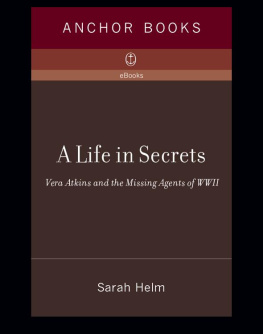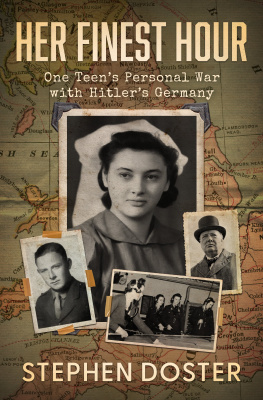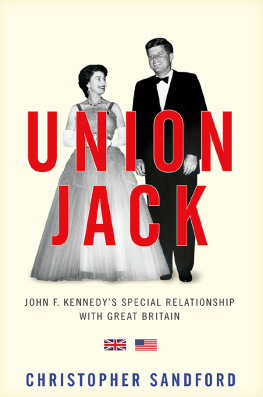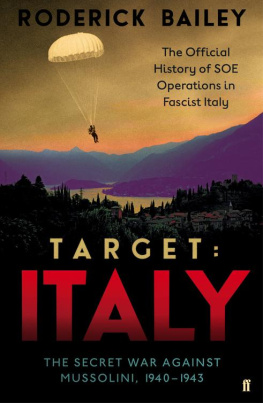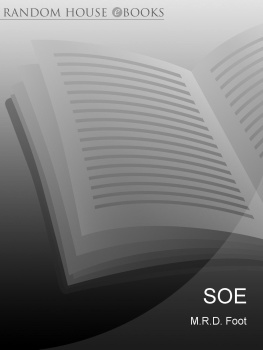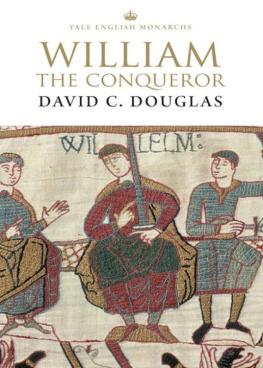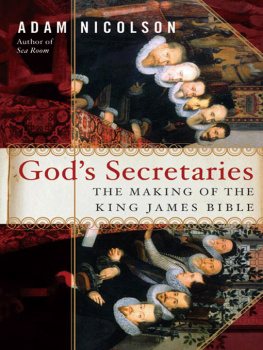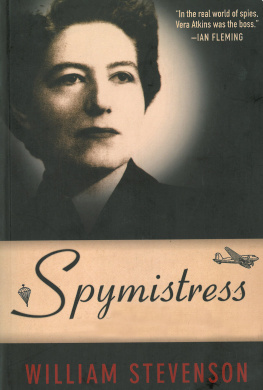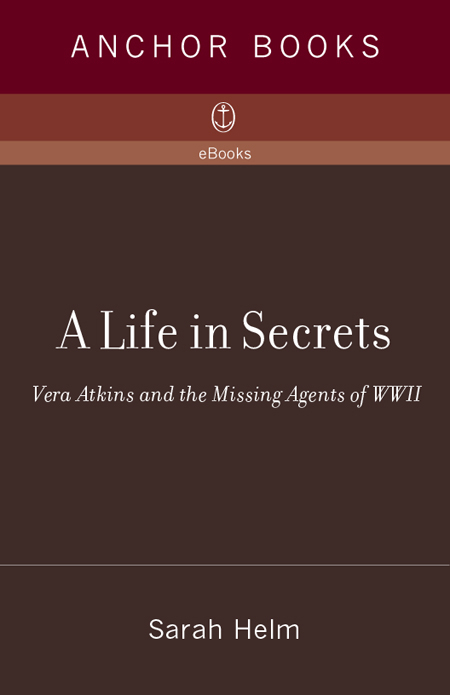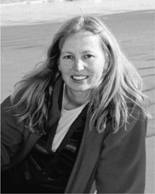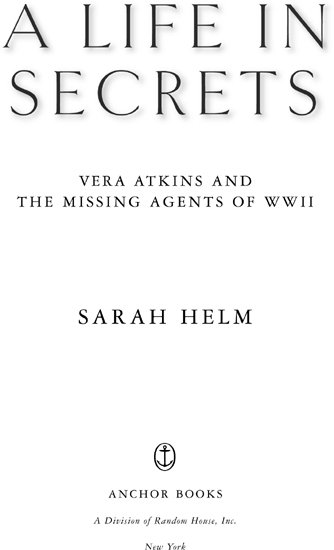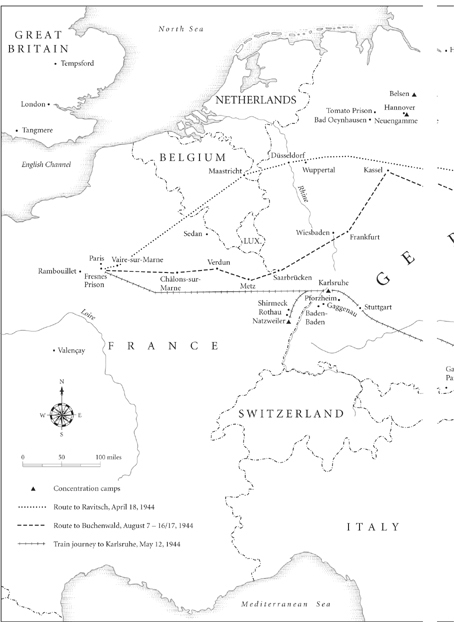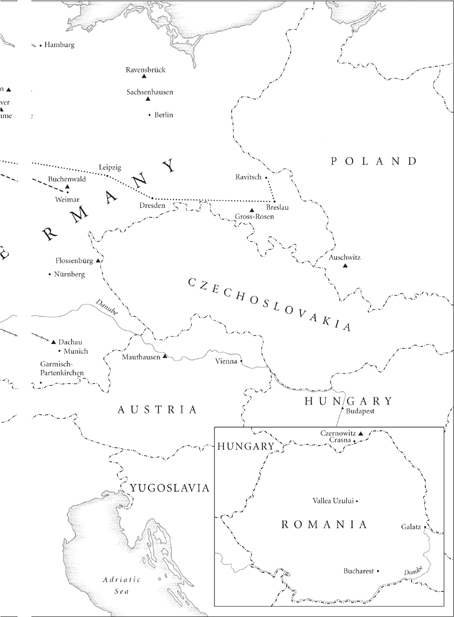ACKNOWLEDGEMENTS
My meeting with Vera Atkins at Winchelsea in 1998 was the inspiration for this book. The power of her personality, impressed upon me on that occasion, remained with me throughout my research and writing.
Vera, however, would not have allowed her life story to be written while she was alive. My greatest debt of gratitude therefore is to Phoebe Atkins, Vera's sister-in-law, and also to Zenna Atkins, Vera's niece, who in 2001 authorised me to write her biography. Phoebe and Zenna opened Vera's archive, encouraged others to assist me, and offered constant advice and encouragement. I must also thank Phoebe and Zenna for their trust. They believed that Vera's life was a story that should be told, but they didn't know which way my research would lead.
Other members of the Atkins and Rosenberg families have generously given their time, hospitality, and assistance. Ronald Atkins talked engagingly about his aunt and his father, Ralph Atkins. Without Karina and Peter Rosenberg, Hillel Avidan, and Iris Hilke much of Vera's wider family history would have remained hidden.
The first idea for a book was taken up by my agent Natasha Fairweather, whose support, advice, and patient encouragement saw the project to fruition.
I drew regularly on the advice of experts. Foremost among them were Duncan Stuart, the SOE adviser; Michael Foot, the official historian of SOE in France; Mark Seaman, at that time historian at the Imperial War Museum; and Dennis Deletant, professor of Romanian Studies at UCL. Jean Overton Fuller generously spared the time to talk about her ground-breaking investigations into SOE in the 1950s and her many encounters with Vera.
There were certain individuals from different sections of her life whom I returned to again and again for guidance about her character and motivation: among them were Annie Samuelli, Barbara Dicker Worcester, Nancy Roberts, George Millar, John da Cunha, and Sacha Smith.
At Little, Brown, I was indebted to Alan Samson, who first backed the project; to Ursula Mackenzie, who took it up with enthusiasm and gave greatly valued advice; and to Stephen Guise for his astute editorial suggestions.
In the United States, at Nan A. Talese/Doubleday, I would like to thank Nan Talese and Lorna Owen for fresh ideas that shaped the book for U.S. readers.
For his support and guidance I am deeply grateful to my partner, Jonathan Powell, who read drafts and often cared for our daughters, Jessica and Rosamund, while I worked. I am also indebted to Katrina Bar-nicoat, Richard Tomlinson, Teresa Poole, and Tony Rennell, who all read the first completed manuscript.
I am grateful for the assistance of researchers, archivists, and librarians in several countries, particularly in London at the National Archives, the Imperial War Museum, and the London Library. I am indebted to David List, specialist researcher at the National Archives, who followed leads through countless SOE and war crimes files; to Mihai Alin Pavel, who guided me through equally labyrinthine Romanian family trees; and to Dr. Helmut Koch of the Stadtarchiv in Karlsruhe.
Countless peopletoo numerous to mention by namewho knew Vera or knew her world have willingly given time to talk to me or offer practical help, in places as far apart as Galatz and Karlsruhe to the Special Forces Club and Winchelsea.
The family of Hans Kieffer, near Stuttgart, considered carefully whether to talk to me about their father, and their decision to do so was greatly appreciated. Dr. Michael Stolle of Karlsruhe University gave invaluable advice on the Gestapo and on war crimes.

I wish to thank most profoundly each one of Vera's SOE colleagues and their families, as well as those who worked with her on war crimes investigation. Tim Buckmaster readily advised on his father's work and friendship with Vera. Judith Hiller made invaluable contributions. I have been acutely conscious throughout my research that many of my inquiries led to the reexamination of the most personal and painful events. Yvonne Baseden, Robert Sheppard, and Jean-Bernard Badaire survived the concentration camps, and I am deeply grateful to them for sharing memories. Lisa Graf's vivid recollection of her imprisonment in Karlsruhe, and of the agents there, was an inspiration.
I should like to thank Vilayat Inayat Khan for his readiness, despite failing health, to talk so movingly about Nora and about the search for her, and I am also grateful to Claire and Hidayat Inayat Khan for their help. Anthony and Francis Suttill talked about their father and generously shared information on numerous occasions. Diana Farmiloe and Helen Oliver, whose sisters, Yolande Beekman and Lilian Rolfe, died in concentration camps, kindly recollected events and passed on papers and photographs. Without the help of these survivors and relatives I could not have begun to understand the suffering and the courage of the dead, whose memory I have sought to preserve. Without the help of all these people I could not have followed Vera's trail.

